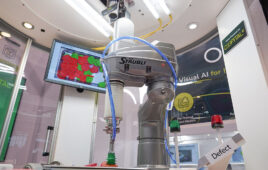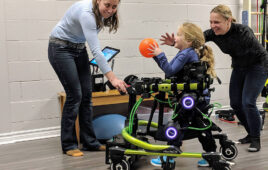|
Listen to this article
|

Fourier Intelligence has rebranded and is now operating under Fourier and Fourier Rehab. | Source: Fourier
Fourier Intelligence Co. this month said it is rebranding to Fourier and Fourier Rehab. The Shanghai-based company said the strategic move reflects its commitment to expanding its innovations in humanoid robotics and rehabilitation technology.
Founded in 2015, Fourier said it has developed robots equipped with dexterity and intelligence for medical rehabilitation, scientific research, and other applications. It serves more than 2,000 organizations and hospitals in more than 40 countries and regions.
The company claimed that the change will help it provide more comprehensive and versatile products to meet diverse market needs and advance its “full-stack” technology for the betterment of society.
Fourier to continue developing humanoid
The Fourier unit will continue developing the GR-1 general-purpose humanoid robot. It launched production for the robot in December 2023. Before that, the company focused on manufacturing exoskeletons and rehabilitation devices.
The GR-1 platform includes 40 degrees of freedom distributed throughout its body, which measures 1.65 m (5 ft., 5 in.) in height and weighs 55 kg (121.2 lb.). The joint module that is fitted at the hip of the robot is capable of producing a peak torque of 300 Nm, which allows it to walk at a speed of 5 kph (3.1 mph) and carry goods weighing up to 50 kg (110.2 lb.).
GR-1 also features an “integrated emotion AI module,” a high-resolution oval display, and circular microphone array for its voice-recognition system. These features make human-machine interactions more natural, Fourier told The Robot Report.
GR-1 is among the humanoid robots being developed and tested by the likes of Boston Dynamics, Agility Robotics, Apptronik, Figure AI, and Ubtech.
Fourier Rehab to focus on healthcare services
While Fourier puts all of its focus on GR-1, Fourier Rehab will act as the company’s dedicated rehabilitation technology arm. This part of the company will operate as a specialized subsidiary under the Fourier Group.
Fourier Rehab said it is committed to revolutionizing the quality of rehabilitation and healthcare services globally. The company said it plans to deliver state-of-the-art systems to achieve positive clinical outcomes for therapists and patients.
This branch of the company plans to continue focusing on developing user-friendly exoskeletons and rehabilitation robots. Fourier also offers rehabilitation devices for the upper limbs, lower limbs, movement and balance, and electrotherapy.
Fourier’s previous work, like the Exoskeleton Robot Open Platform (EXOPS) developed with National Instruments (NI) and the University of Melbourne, will likely live under this new brand. EXOPS is intended to be a development platform for schools, research and development institutions, and clinical centers.
Fourier Rehab this week partnered with metabolic and cardiorespiratory diagnostic systems provider COSMED to distribute Fourier’s technologies. It also partnered with ProCare, which will represent Fourier in the Benelux region in Europe.







Tell Us What You Think!